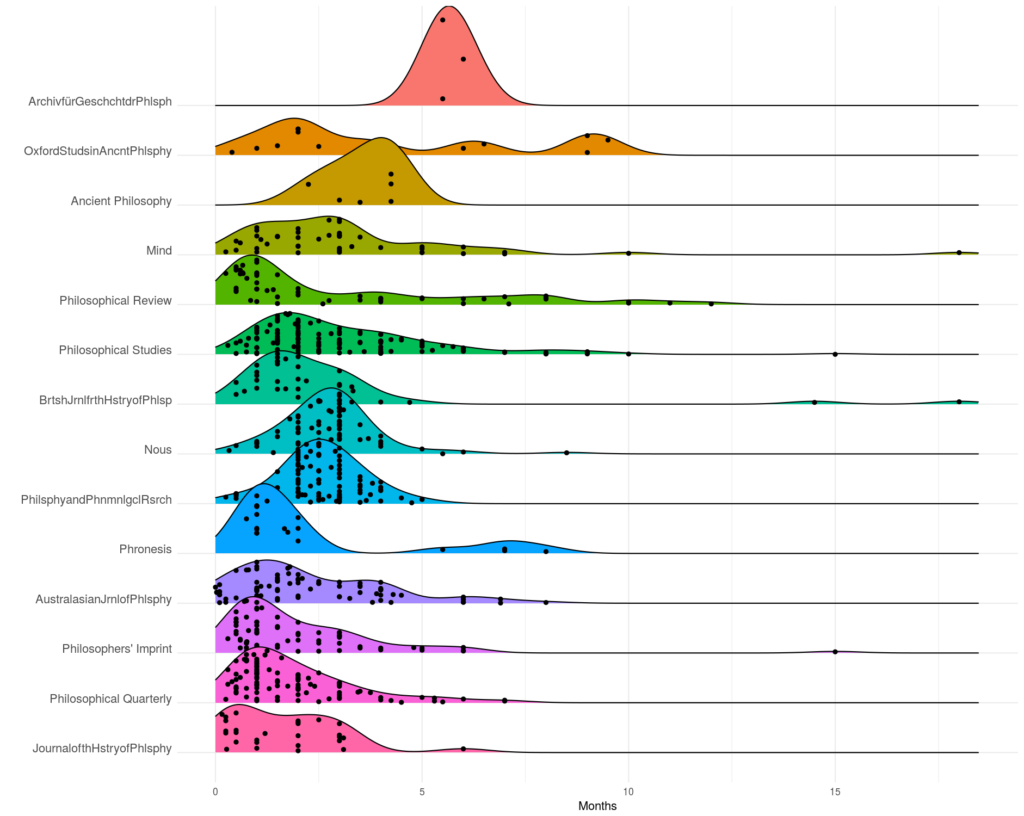Last September, I highlighted what recent public surveys submitted to the APA Journal Surveys project indicated about the editorial experience at journals that specialize in ancient philosophy and the history of philosophy. I’m writing to provide another update based on recent surveys (though things have not changed too much). The journals that get the best ratings for editorial experience are also the quickest. The British Journal for the History of Philosophy and the Journal of the History of Philosophy continue to lead the way in editor experience scores. The APA journal surveys site asks respondents to rate the overall editorial experience from 1-5 and these two are the only ones with ratings in the 4.5-5 range, with BJHP averaging 4.6 and JHP averaging 4.5. They are also among the quickest (1.5 months for JHP and 2.9 for BJHP) and among the most transparent about their editorial practices.
The next three journals with good editorial experience scores are the Classical Quarterly, the History of Philosophy Quarterly, and Phronesis. They all have editorial experiences scores around 4 (4.1 for CQ, and 3.9 for HPQ and Phronesis). Phronesis has the quickest turnaround time (1.9 months), with CQ averaging 3.5 months and HPQ 5.6 months.
Ancient Philosophy has middling editorial experience ratings (3.4/5) and averages 4.8 months to respond, while Archiv für Geschichte der Philosophie (2.4/5) and Oxford Studies in Ancient Philosophy (2.2/5) receive the lowest editorial experience ratings. They also have fairly long wait times (average of 6.1 months for Archiv and 8.8 months for OSAP). However, Victor Caston, editor of OSAP, informed me last year that times to decision for manuscripts submitted in 2019 were significantly lower than in 2018. He expected the overall average decision time for 2019 manuscripts to be within or lower than OSAP‘s target range of 4 to 6 months.
There are no recent surveys available for Apeiron: A Journal for Ancient Philosophy and Science, but Luis Salas, Associate Editor at Apeiron, shared their internal statistics last year, showing averaged decision times of 3 months. Salas noted that 345 of the manuscripts (about 75% of the total) received a decision in less than 3 months and about 40 took 6 or more months. There are a number of other journals that also need more reports including Ancient Philosophy Today, Classical Philology, Epoché, Journal of Ancient Philosophy, Philosophie antique, and Polis. Please submit your experiences to the APA Journal Surveys project so we can get a better picture of all these journals. The available statistics fit do, however, largely fit with the experiences that I have heard from others in the ancient philosophy community. I will continue to revisit this topic as the data warrants or as I get new information. If you are part of the editorial staff at an ancient philosophy or history of philosophy journal and have data about your journal to share, please contact me. I would be happy to share more complete information about submission statistics with readers.
Readers should also be aware of a number of good generalist philosophy journals that publish pieces in the history of philosophy and receive good editorial experience ratings, including Australasian Journal of Philosophy, Ergo, Philosophers’ Imprint, and Philosophical Quarterly. These journals are all well-regarded and have quick turnaround times, with all of them averaging less than 2.5 months to decision. They have also all fairly consistently published articles on Greek and Roman philosophy and are committed to doing so. My ancient philosophy journal listings include the generalist journals that meet these conditions on the first sheet. Both Ergo and Philosophers’ Imprint are open access, without requiring the author to pay any fees (though Philosophers’ Imprint does have a $20 USD submission fee). Ergo is also triple anonymous, so that neither editors nor referees know the identity of authors, something which is not true, to my knowledge, of any of the specialist ancient philosophy journals or history of philosophy journals. For a broad, crowd-sourced listing of philosophy journals, readers may be interested in this editable spreadsheet of all philosophy journals.
Below I have a summary of the surveys discussed above and, then, for those history and generalist journals that have a decent amount of data on submission times, a visualization using this app created by Jonathan Weisberg, (unfortunately, the available data for the visualization only extends through May 2018).
| Journal name | Number of Surveys | Comment count | Comment quality | Editor experience | Response time (months) |
Reporting Time range
|
| Ancient Philosophy | 28 | 1.3 | 2.9 | 3.4 | 4.8 | from 2011 on |
| Archiv für Geschichte der Philosophie | 8 | 1.8 | 3.1 | 2.4 | 6.1 | from 2018 on |
| British Journal for the History of Philosophy | 41 | 2 | 3.8 | 4.6 | 2.9 | from 2015 on |
| Classical Quarterly | 17 | 1.1 | 3.3 | 4.1 | 3.5 | from 2011 on |
| History of Philosophy Quarterly | 18 | 2 | 4 | 3.9 | 5.6 | from 2015 on |
| Journal of the History of Philosophy | 27 | 1.1 | 3.2 | 4.5 | 1.5 | from 2015 on |
| Oxford Studies in Ancient Philosophy | 22 | 1 | 3.3 | 2.2 | under 4 months in 2019; 8.83 in 2018 (8.8 in the available surveys) | from 2015 on |
| Phronesis | 30 | 0.9 | 2.9 | 3.9 | 1.9 | from 2015 on |
Where a decent number of surveys were available I used surveys from 2015 on, since the most important thing for potential authors is the current editorial situation. Where there were not as many surveys available, I went back to 2011. The full spreadsheet with all the records assembled from the publicly available APA Journal Surveys data is available here.

Full disclosure: At the time of posting, I have personally submitted to, published at, and/or refereed for all of these journals except for Classical Quarterly. The basis for this post is not, however, my personal experiences, which do not always match the overall trends. For example, my last submission at OSAP got two sets of helpful comments within a reasonable timeframe (though it was rejected).



7 Comments
G.S.Subramanian
Being someone interested in Ancient Greek Philosophy ( but not an Academic) I am eager to learn more from your project. Deep regards for your splendid work.
Anonymous
Has OSAP really reformed? I submitted an article to OSAP in July of 2019, and it still hasn’t been reviewed. Between 2016 and 2018, they took 6 months to review an article; they’re now on fifteen months.
MW
I’m currently in my fifteenth month of waiting on an article for OSAP, and I have friends in the ancient philosophy community who have reported similar wait times.
Diego Machuca
Two important ancient philosophy journals are missing from the list: Elenchos and Méthexis (both in Italy now). You could also include Philosophie Antique (France) and Revue de Philosophie Ancienne (Belgium).
Now, in my case, OSAP took 6 months to review my article (final decision: acceptance). I suppose that part of the reason is that the editor carefully reads and comments on articles. Apeiron has a good response time, although the referee reports are sometimes very good and sometimes extremely poor. Ancient Philosophy usually takes a lot of time to review articles, but reports are, in my experience, always good. Phronesis is quick, but I in my own case the reports were always of poor quality — I sometimes had the impression that the referees were not specialists in my area.
Caleb Cohoe
Thanks for sharing your experience! Diego, the journals you mention are all on my list of ancient philosophy journals (https://docs.google.com/spreadsheets/d/1U8UzDF2uETJ8mK8ZZJkcsI88Aow_OAbR_kwOLtF3368/edit?usp=sharing), but they don’t have surveys submitted on them in the APA Journal Surveys project (perhaps since it is more USA focused) so I don’t have any data to work with there.
Diego Machuca
I see. Sorry I missed that.
Pingback: